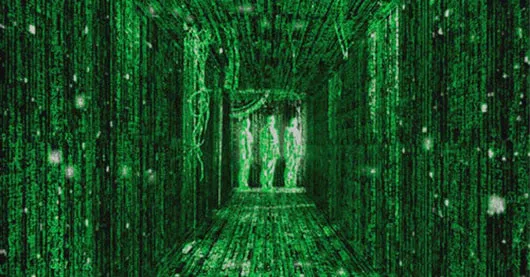In the last few decades there have been numerous films that take the struggle between mankind and its increasingly intelligent and autonomous technology as a leitmotif. Ranging from Stanley Kubriks magnificent artwork Space Oddysee 2001 (1968), which is better defined as a posthuman than a nextnature film, to Disney’s cartoonish Tron (1982), to the Terminator series (1984, 1991, 2003).
The notion of technology becoming competitive with the people who created it, is clearly a thankful movie subject. Pity though, the issue is always projected in the future – at distance from our everyday lives – as this limits the opportunity to reflect upon the co-evolutionary state people and technology have been caught up for a long time already.
Apparently this is a movie law difficult to get around, and one that directors Andy and Larry Wachowski willingly accept. Yet they do something brilliant. They have a philosophical idea that they want to get out, but they are aware their idea is difficult to sell. If they had made it too explicit their movie would have been an art house film, or a giant flop. So they took their idea and wrapped it up in a sci-fi story, in an action packed blockbuster.
The subtle premises of The Matrix (1999), is that the people subjected by the machines aren’t aware of the artificial intelligence that is ruling their lives. Like the prisoners in Plato’s Cave they’re blind to the simulation drawn before their eyes – a situation only stirred up with the arrival of the manga style dressed Christ–like savior Thomas Anderson, aka Neo, aka The One, played by a perfectly casted Keanu Reeves. Postmodernity in the overdrive? That's not giving enough credit.
Through their syncretic cocktail of ingredients from western and non-western philosophy (*), art and religion, the Wachowski brothers manage to achieve exactly what they want. Like a Trojan horse, they’ve planted something into your mind, the seed of doubt, even if you have no idea it's there, yet it's there. That voice in the back of your mind that something is wrong. That feeling you got left with after seeing the movie that it wasn't just about computers and artificial intelligence but about something else, something more important, something you're familiar with but just can't put your finger on.
The Matrix is a philosophical film that has cut through an entire generation, which now thinks differently about the technology in their surroundings than any generation before them. They’re aware that there may never be a day that technology awakes, becomes conscious and – politely or impolitely – introduces itself to us. They’re aware that this doesn’t withstand that technology is a strong all-pervasive force in our lives: A force that is not only driven by us, but in turn, also drives us. What is the Matrix, you ask? Something closer to reality than you think.
https://www.youtube.com/watch?v=m8e-FF8MsqU
(*) Prior to the start of the filming the Wachowski brothers required the principal actors of the film to read three books: ‘Simulacra and Simulations’, by Jean Baudrillard, ‘Out of Control’ by Kevin Kelly, and 'Introducing Evolutionary Psychology' by Dylan Evans.


Comments (0)
Share your thoughts and join the technology debate!
No comments yet
Be the first to share your thoughts!